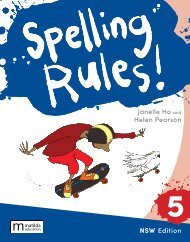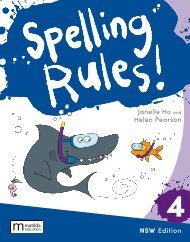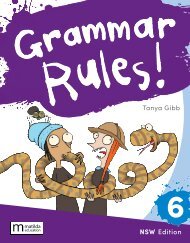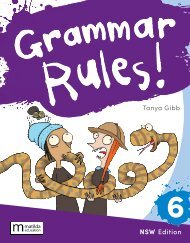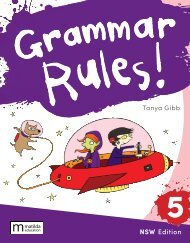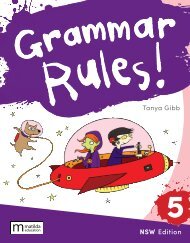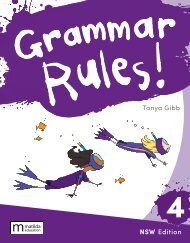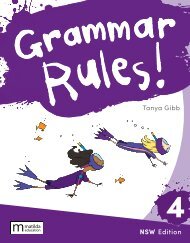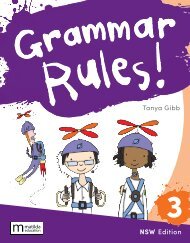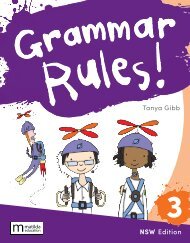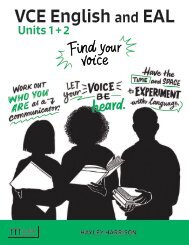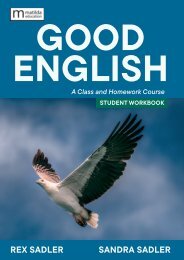Spelling Rules! NSW 3 student book sample/look inside
You also want an ePaper? Increase the reach of your titles
YUMPU automatically turns print PDFs into web optimized ePapers that Google loves.
Janelle Ho and<br />
Helen Pearson<br />
3<br />
<strong>NSW</strong> Edition
Janelle Ho and<br />
Helen Pearson<br />
STUDENT<br />
BOOK<br />
3<br />
<strong>NSW</strong> Edition<br />
Name:<br />
Class:
Contents<br />
Scope and Sequence.......................................................... 3<br />
Note to Teachers and Parents.......................................... 4<br />
Units 1–35.............................................................................. 6–75<br />
List Words in Unit Order..................................................... 76<br />
List Words in Alphabetical Order..................................... 78<br />
<strong>Spelling</strong> <strong>Rules</strong> and Tips...................................................... 80<br />
SLLURP<br />
SLLURP summarises the spelling strategies that you can use to learn new words.<br />
Say<br />
Listen<br />
Look<br />
Understand<br />
Remember<br />
Practise<br />
Say the word carefully and slowly to yourself.<br />
Listen to how each part of the word sounds in sequence.<br />
Look at the patterns of letters in the word and the shape of the word.<br />
Understand rules, word meanings and word origins.<br />
Remember all the similar words you can already spell and relate<br />
this knowledge to any new word.<br />
Practise writing the word until it is firmly fixed in your long-term<br />
memory.<br />
2 <strong>Spelling</strong> <strong>Rules</strong>! Student Book 3 (ISBN 9780655092605) © Janelle Ho, Helen Pearson
Scope and Sequence<br />
Unit Vowels Consonants<br />
1<br />
2<br />
3<br />
4<br />
5<br />
a-e, i-e<br />
Letter<br />
patterns<br />
SKILL FOCUS<br />
Morphology<br />
and etymology<br />
-ed; irregular<br />
verbs and plurals<br />
Homophones/<br />
Confusing words<br />
brake/break<br />
Topic words<br />
brave, shade, brake, table, awake, aeroplane, while, beside,<br />
spite, alive, advise, promise<br />
o-e, u-e -ing, -y close, alone, erode, suppose, approve, wardrobe, huge, pure,<br />
cube, refuse, accuse, conclude<br />
oo, ee, ea,<br />
ai, oa<br />
ow, ou, oy<br />
ey, ay<br />
to/too/two,<br />
rowed/road/rode,<br />
great/grate<br />
shook, blood, choose, soothe, bleed, breath, breathe, threat,<br />
explain, throat, poach, cockroach<br />
know, growl, below, allow, touch, grouchy, pounce, mountain,<br />
royal, money, trolley, layer<br />
ch, tch cord/chord arch, coach, attach, clench, monarch, technology, chemical,<br />
scheme, parachute, sketch, scratch, butcher<br />
6 REVISION<br />
7<br />
8<br />
9<br />
10<br />
11<br />
ie, ei<br />
au, aw<br />
medial double<br />
consonants<br />
silent letters:<br />
kn, wr<br />
le<br />
peace/piece,<br />
cheap/cheep,<br />
steel/steal<br />
12 REVISION<br />
13<br />
14<br />
15<br />
16<br />
17<br />
soft and<br />
hard g<br />
gh, ph<br />
words ending<br />
in f, ff, fe, ffe<br />
great/grate,<br />
grown/groan,<br />
guest/guessed<br />
months of the<br />
year<br />
grief, relief, fierce, niece, sieve, thieve, believe, friend, weird,<br />
receive, ceiling, foreign<br />
taut, haul, fault, pause, sauce, sausage, audio, flaw, thaw,<br />
drawer, sprawl, awesome<br />
gallop, collide, swallow, channel, tennis, rubbish, common,<br />
lesson, borrow, attempt, affect, effect<br />
saddle, waddle, struggle, scribble, settle, drizzle, grumble,<br />
candle, stable, wobble, syllable, startle<br />
January, February, March, April, May, June, July, August,<br />
September, October, November, December<br />
gather, guest, guide, together, germ, gentle, genius, giant, large,<br />
stage, gigantic, gypsy<br />
qu quit/quiet/quite quiet, quite, queue, quarter, squirm, squeal, squawk, equal,<br />
request, require, squirrel, mosquito<br />
igh, eigh,<br />
aigh, ough,<br />
augh<br />
irregular past<br />
tense verbs<br />
tele, phone, photo,<br />
auto, graph<br />
changing f to v;<br />
collective nouns<br />
18 REVISION<br />
19<br />
20<br />
21<br />
22<br />
23<br />
silent letters:<br />
kn, wr, t, gn,<br />
h, s, b<br />
un-, mis-, dis-<br />
proper nouns,<br />
astrophes of<br />
possession<br />
-er, -est<br />
24 REVISION<br />
25<br />
26<br />
27<br />
28<br />
29<br />
words<br />
ending<br />
in o, oe,<br />
oo, a<br />
-ful, -less:<br />
changing y to i<br />
-ness, -ion, -ship,<br />
-dom, -hood,<br />
-wards<br />
non-English<br />
words<br />
Australian states<br />
and territories,<br />
and capitals<br />
Aboriginal<br />
Australian words<br />
uni-, bi-, tri-, kilo-,<br />
dec-, centi-, millimeasurement<br />
delight, midnight, frighten, frightful, neighbour, height, straight,<br />
enough, though, through, daughter, naughty<br />
laugh, toughen, graph, photograph, autograph, elephant,<br />
telephone, sphere, trophy, alphabet, phrase, physical<br />
puff, cliff, staff, shelf, wolf, scarf, wharf, thief, knife, handkerchief,<br />
yourself, giraffe<br />
wrinkle, wrestle, knead, knowledge, gnaw, gnome, hour, honest,<br />
island, tongue, doubt, ghost<br />
words beginning<br />
with a-, alacross,<br />
always, about, around, almost, already, ahead, asleep,<br />
above, another, along, altogether<br />
untidy, unlikely, mischief, misplace, misbehave, mistake,<br />
disagree, disgrace, disgusting, dishonest, disobey, discover<br />
country, state, northern, western, south, capital, territory,<br />
Australia, New South Wales, Victoria, Tasmania, Queensland<br />
Mob, Elder, Auntie, Uncle, deadly, gammon, tucker, humpy,<br />
yakka, yidaki, boomerang, marngrook<br />
harmful, peaceful, colourful, grateful, boastful, plentiful,<br />
beautiful, helpless, useless, careless, fearless, lifeless<br />
kindness, happiness, revision, television, direction, friendship,<br />
kingdom, freedom, forwards, backwards, childhood,<br />
neighbourhood<br />
metre, kilometre, centimetre, millimetre, litre, gram, decade,<br />
uniform, bicycle, triangle, dozen, dollar<br />
ex in- exit, extra, expert, experience, extreme, example, exact, excuse,<br />
excellent, exclaim, excite, exercise<br />
irregular plurals<br />
confusing words:<br />
there/their/they’re<br />
30 REVISION<br />
31<br />
32<br />
33<br />
34<br />
hero, piano, echo, radio, toe, canoe, kangaroo, taboo, sofa,<br />
drama, idea, era<br />
ion -ion station, fiction, section, fraction, cushion, fashion, mission,<br />
expression, religion, million, champion, information<br />
-ment<br />
-able, -ible, -ly<br />
desert/dessert,<br />
course/coarse<br />
35 REVISION<br />
non-English<br />
words<br />
WORD LIST<br />
movement, statement, argument, amazement, measurement,<br />
government, environment, treatment, development,<br />
attachment, encouragement, disappointment<br />
reliable, capable, adorable, available, comfortable, miserable,<br />
valuable, horrible, terrible, sensible, flexible, responsible<br />
igloo, robot, yacht, iceberg, khaki, tsunami, kindergarten,<br />
kowtow, pizza, spaghetti, chocolate, restaurant<br />
<strong>Spelling</strong> <strong>Rules</strong>! Student Book 3 (ISBN 9780655092605) © Janelle Ho, Helen Pearson 3
Note to teachers and parents<br />
<strong>Spelling</strong> <strong>Rules</strong>!<br />
Some <strong>student</strong>s are natural spellers, but the vast majority of <strong>student</strong>s need formal, systematic and sequential<br />
instruction about the way spelling works and the strategies they can use to become independent, confident spellers.<br />
The <strong>Spelling</strong> <strong>Rules</strong>! program is based on sound linguistic and pedagogical theory. It is informed by research into how<br />
<strong>student</strong>s of different ages acquire and apply spelling skills, and how those skills move from the working to the longterm<br />
memory. The program closely follows the <strong>NSW</strong> English Syllabus. <strong>NSW</strong> Syllabus references are provided in the<br />
two Teacher Resource Books. The program consists of seven Student Books.<br />
Each <strong>student</strong> <strong>book</strong> contains units of work, with each unit designed to be used over the course of a week. The content<br />
of each unit follows the suggested instructional sequence in the <strong>NSW</strong> English Syllabus. Each unit simultaneously<br />
develops new skills and reinforces skills from previous units. Where appropriate, topic words from other syllabus areas<br />
are included. When spelling rules and tips are introduced, only known sounds and letter patterns are used so that<br />
<strong>student</strong>s focus on one skill at a time. Regular revision units enable teachers to assess <strong>student</strong> progress and reinforce<br />
key rules and patterns from previous units. Books 1 to 4 also include a simple reflection activity that encourages<br />
<strong>student</strong>s to assess their own progress and provides you with a starting point for discussion.<br />
<strong>Spelling</strong> knowledge<br />
Learning to spell involves developing different kinds of spelling knowledge:<br />
T Kinaesthetic knowledge – the physical feeling when saying different sounds and words, and when writing<br />
the shapes of letters and words<br />
T Phonological knowledge – how a word sounds and the patterns of sounds in words<br />
T Visual knowledge – how letters and words <strong>look</strong> and the visual patterns in words<br />
T Morphemic knowledge – the meaning or function of words or parts of words<br />
T Etymological knowledge – the origins and history of words and the effect this has on spelling patterns.<br />
Icons used in Student Book 3<br />
The following icons identify the main spelling strategy that <strong>student</strong>s will use to complete an activity.<br />
Say the word. (Kinaesthetic knowledge)<br />
These activities ask <strong>student</strong>s to experience how<br />
sounds feel in the mouth and jaw. Changing the positions<br />
of the jaw, lips and tongue changes the sounds we make.<br />
Encourage <strong>student</strong>s to pronounce the sounds and words<br />
accurately. If they mispronounce a sound or word, they<br />
may misrepresent it in writing.<br />
Listen to the word. (Phonological knowledge)<br />
These activities focus on discriminating between<br />
different sounds and breaking up words into syllables or<br />
individual sound segments (phonemes).<br />
Look at the word. (Visual knowledge) These<br />
activities help <strong>student</strong>s to see how the sound<br />
is represented using combinations of letters, and to<br />
associate this visual pattern with what they are hearing.<br />
Students will develop the ability to know when a word<br />
does or does not ‘<strong>look</strong> right’.<br />
Understand the word. (Morphemic and<br />
etymological knowledge) These activities focus<br />
on word meanings, word families, prefixes and suffixes,<br />
spelling rules, word origins and so on, which help embed<br />
spelling in the long-term memory.<br />
Practise writing the word. (Kinaesthetic<br />
knowledge) These activities develop <strong>student</strong>s’<br />
awareness of the physical movement involved in writing<br />
the word. By practising writing the word a number of<br />
times and in different contexts, the spelling becomes<br />
embedded in the long-term memory.<br />
I can do this.<br />
I am not sure.<br />
I need help.<br />
This icon highlights useful spelling rules.<br />
This icon tells <strong>student</strong>s that a special clue<br />
or hint is provided for an activity. It may<br />
be a spelling, grammar or punctuation<br />
convention, or a definition of a useful term.<br />
The reflection encourages <strong>student</strong>s to<br />
assess their progress across each unit.<br />
4 <strong>Spelling</strong> <strong>Rules</strong>! Student Book 3 (ISBN 9780655092605) © Janelle Ho, Helen Pearson
Student Book 3<br />
Units of work<br />
Student Book 3 contains 35 weekly units of work. See the Scope and Sequence chart on page 3 for more<br />
information. Each revision unit gives <strong>student</strong>s an opportunity to self-assess.<br />
Word lists<br />
In Student Book 3, each unit (except Revision) has a list of spelling words. The core words in the lists have been chosen<br />
to support the learning focus and strategies being taught in the unit.<br />
<strong>Spelling</strong> lists enable a spelling element to be focused on, and provide sufficient examples to consolidate the<br />
teaching point. Topic words come from other curriculum areas, such as mathematics and social sciences. In addition,<br />
homophones and words that are easily confused with each other are explained and practised.<br />
SLLURP<br />
Each word list begins with a reminder for <strong>student</strong>s to SLLURP. SLLURP summarises the strategies that will help spelling<br />
move from <strong>student</strong>s’ working memory to their long-term memory. These strategies are provided on page 2, for easy<br />
reference.<br />
Unit at a glance<br />
Space to practise<br />
list words<br />
SLLURP reminds<br />
<strong>student</strong>s about strategies<br />
they can use to learn the<br />
words.<br />
Unit banner<br />
features the spelling<br />
focus in the context<br />
of a fun joke<br />
Sequenced activities<br />
– each activity focuses on<br />
a specific spelling strategy.<br />
Some activities refer to<br />
content in other curriculum<br />
areas.<br />
List words<br />
support the learning<br />
of the spelling focus<br />
for the unit. Words<br />
come from across<br />
the curriculum.<br />
<strong>Spelling</strong> focus<br />
highlighted in<br />
colour<br />
15<br />
Say Listen Look Understand Remember Practise<br />
2<br />
3<br />
delight<br />
midnight<br />
frighten<br />
frightful<br />
neighbour<br />
height<br />
straight<br />
enough<br />
though<br />
through<br />
daughter<br />
naughty<br />
Complete the tables.<br />
verb<br />
buy<br />
cough<br />
teach<br />
Gorillas can be taught<br />
to use sign language to<br />
communicate with people.<br />
Choose the right word for each space.<br />
I<br />
past tense<br />
Write ei, ou or au.<br />
c — — gh<br />
c — — ght<br />
en — — gh<br />
d — — ghter<br />
t — — gh<br />
thr — — gh<br />
w — — ght<br />
t — — ght<br />
th — — gh<br />
r — — gh<br />
b — — ght<br />
n — — ghty<br />
— — ght n — — gh<br />
Most verbs show the past tense by<br />
adding ed.<br />
discover discovered<br />
Irregular verbs have a different form<br />
in the past tense.<br />
write wrote throw threw<br />
verb<br />
think<br />
fight<br />
weigh<br />
tough though through thought<br />
past tense<br />
I cut the steak but it was too to chew.<br />
Even it was sunny, I it might rain later.<br />
It was to train the lion to jump the burning hoop.<br />
Write a list word that is an antonym.<br />
I can do this.<br />
I am not sure.<br />
34 <strong>Spelling</strong> <strong>Rules</strong>! Student Book 3 (ISBN 9780655092605) © Janelle Ho, Helen Pearson<br />
<strong>Spelling</strong> <strong>Rules</strong>! Student Book 3 (ISBN 9780655092605) © Janelle Ho, Helen Pearson<br />
35<br />
4<br />
good<br />
pleasant<br />
5<br />
crooked<br />
comfort<br />
Proofread this text. The text has eight words that are incorrect. Circle the mistakes. Then write<br />
the correct spelling of the words in the boxes.<br />
Our family is very lucky because we have lovely nieghbours.<br />
My best freind is there daughter, Lily. Together, we are<br />
planning a ‘Freight Night’ party at my home. We are going<br />
to make our home really dark so it feels like middnight.<br />
Everyone has to wear a scary costume. If it isn’t scary<br />
enugh, they have to go through a tunel where we will play<br />
a trick on them. I think we’ll all have a deelightful time.<br />
6<br />
z<br />
delight (noun)<br />
delight (verb)<br />
smell (noun)<br />
smell (verb)<br />
sigh (noun)<br />
sigh (verb)<br />
Remember! Antonyms are words with the opposite meaning.<br />
day, night easy, difficult high, low<br />
Write a sentence using each word.<br />
I need help.<br />
Icons identify the<br />
main spelling strategy<br />
<strong>student</strong>s will use in an<br />
activity.<br />
<strong>Spelling</strong> tips and<br />
rules introduced<br />
when <strong>student</strong>s need<br />
them to complete an<br />
activity.<br />
Reflection allows<br />
<strong>student</strong>s to assess<br />
their progress.<br />
<strong>Spelling</strong> <strong>Rules</strong>! Teacher Resource Book 3-6<br />
Full teacher support for Student Book 3 is provided by <strong>Spelling</strong> <strong>Rules</strong>! Teacher Resource Book 3–6. Here you will<br />
find valuable background information about spelling development and spelling knowledge, along with practical<br />
resources, such as:<br />
T teaching tips for every unit in Student Book 3 T guidelines for assessment and diagnosis of errors<br />
T extra word lists<br />
T activities to support struggling spellers<br />
T strategies for teaching spelling<br />
T worthwhile extension for more able spellers.<br />
<strong>Spelling</strong> <strong>Rules</strong>! Student Book 3 (ISBN 9780655092605) © Janelle Ho, Helen Pearson<br />
5
1<br />
Tapeworms can live <strong>inside</strong><br />
people. They can be up to<br />
25 metres long – that’s the<br />
length of two buses!<br />
Say Listen Look Understand Remember Practise<br />
brave<br />
shade<br />
brake<br />
table<br />
awake<br />
aeroplane<br />
while<br />
beside<br />
spite<br />
alive<br />
advise<br />
promise<br />
I<br />
gain<br />
lied<br />
label<br />
smile<br />
drive<br />
quite<br />
save<br />
stayed<br />
Find a list word that rhymes. Write another word<br />
that follows the a-e or i-e pattern.<br />
Write the two list words that have the same ending<br />
but do not rhyme.<br />
2<br />
Write an a-e word to match each meaning.<br />
f — — —<br />
sh — — —<br />
sn — — —<br />
br — — —<br />
the front of your head<br />
you don’t do this if you want a beard<br />
a reptile with no legs<br />
willing to face danger<br />
3<br />
Write an i-e word to match each meaning.<br />
sl — — —<br />
pr — — —<br />
m — — —<br />
in — — — —<br />
slip downwards<br />
what something costs<br />
more than one mouse<br />
not outside<br />
6 <strong>Spelling</strong> <strong>Rules</strong>! Student Book 3 (ISBN 9780655092605) © Janelle Ho, Helen Pearson
4<br />
Colour the correct word.<br />
Boil the eggs in a pan pane of water, then cool them in a tub tube .<br />
Our car care was parked for too long and we got a fin fine .<br />
Tomatoes turn red when they are rip ripe .<br />
For most verbs ending in e, you drop the e before adding ed to make<br />
the past tense. live lived bake baked<br />
But be careful: some verbs do not follow this rule!<br />
make made drive drove wake woke<br />
5<br />
Complete each sentence by writing the verb in the past tense.<br />
Jane<br />
blame<br />
her dog for messing up her homework.<br />
Mrs Smith<br />
Sanjay<br />
slide<br />
advise<br />
us to read for 20 minutes each day.<br />
on the wet leaves and hurt his foot.<br />
Mum a message for Dad. I it down<br />
leave<br />
write<br />
but I think I’ve<br />
lose<br />
the piece of paper.<br />
Most nouns ending in e make the plural by adding s but some do not.<br />
house houses but mouse mice<br />
6<br />
Write the plural for each noun.<br />
table goose aeroplane<br />
fire crime man<br />
7<br />
Don’t<br />
Don’t<br />
The words break and brake are homophones. Write the correct<br />
homophone.<br />
too quickly or you’ll fall off the bike.<br />
your stride while you run.<br />
I can do this.<br />
I am not sure.<br />
I need help.<br />
<strong>Spelling</strong> <strong>Rules</strong>! Student Book 3 (ISBN 9780655092605) © Janelle Ho, Helen Pearson<br />
7
2<br />
The funny bone is not<br />
actually a bone. It is a<br />
nerve behind your elbow.<br />
Say Listen Look Understand Remember Practise<br />
close<br />
alone<br />
erode<br />
suppose<br />
approve<br />
wardrobe<br />
huge<br />
pure<br />
cube<br />
refuse<br />
accuse<br />
conclude<br />
I<br />
knows<br />
load<br />
moan<br />
brood<br />
Words can rhyme but be spelt differently.<br />
Find a list word that rhymes.<br />
toes<br />
glowed<br />
blown<br />
glued<br />
stews<br />
groove<br />
2<br />
Use the clues to write o-e and u-e words. The mystery word is a shape.<br />
2<br />
1<br />
6<br />
7<br />
4<br />
3<br />
5<br />
1. not spoilt or dirty<br />
2. I — — — — you!<br />
3. Please — — — — — the door.<br />
4. a piece of rock<br />
5. all by yourself<br />
6. Have you — — — — your work?<br />
7. very large<br />
8<br />
8. complete<br />
9<br />
9. an object with six square sides<br />
Mystery word:<br />
8 <strong>Spelling</strong> <strong>Rules</strong>! Student Book 3 (ISBN 9780655092605) © Janelle Ho, Helen Pearson
3<br />
There are many ways to say big. Arrange these words in alphabetical order.<br />
huge large gigantic enormous great<br />
4<br />
Syllables are the beats in a word. Write how many syllables you hear in each shape word.<br />
prism cylinder cube sphere<br />
For words that end in e, drop the e to add ing.<br />
love loving use using<br />
Drop the e to add y to make the adjective. ice<br />
icy<br />
5<br />
Add ing.<br />
close approve amaze<br />
refuse conclude promise<br />
6<br />
Write the adjective by adding y.<br />
not liking work (laze)<br />
having many bones, thin (bone)<br />
hard to please (choose)<br />
bright, glowing (shine)<br />
7<br />
Each set of words has the same spelling pattern, but one word sounds different.<br />
Circle the word with a different sound and then use it in your own sentence.<br />
sure<br />
pure<br />
cure<br />
dove<br />
love<br />
move<br />
I can do this.<br />
I am not sure.<br />
I need help.<br />
<strong>Spelling</strong> <strong>Rules</strong>! Student Book 3 (ISBN 9780655092605) © Janelle Ho, Helen Pearson<br />
9
3<br />
It is easier to float<br />
in sea water than<br />
in fresh water.<br />
Say Listen Look Understand Remember Practise<br />
I<br />
Rearrange the letters to make a list word.<br />
shook<br />
blood<br />
choose<br />
soothe<br />
bleed<br />
breath<br />
breathe<br />
threat<br />
explain<br />
throat<br />
poach<br />
cockroach<br />
2<br />
ooksh ldobo cpoha<br />
soecho rteath theebar<br />
bedel laxinep thorta<br />
Add another word to make a compound word.<br />
door<br />
tooth<br />
moon<br />
spoon<br />
broom<br />
room<br />
3<br />
Write the word in the plural.<br />
breath street tooth<br />
year goose cockroach<br />
4<br />
Add the correct suffix to these verbs. Choose from s, ed or ing.<br />
Dad is sweep the leaves from the driveway.<br />
The wind blew my hat into the water. Luckily, it float .<br />
I hope we see a rainbow when the sun break through the clouds.<br />
After our bushwalk, we feast on hot damper with honey.<br />
Auntie Jean poach an egg for breakfast this morning.<br />
10 <strong>Spelling</strong> <strong>Rules</strong>! Student Book 3 (ISBN 9780655092605) © Janelle Ho, Helen Pearson
5<br />
These pairs of words are related: blood–bleed, breath–breathe. Which are nouns and<br />
which are verbs?<br />
noun<br />
verb<br />
6<br />
Write one from the pairs: blood–bleed, breath–breathe.<br />
Be careful! If you cut yourself, you will .<br />
I think there is a lot of<br />
but Mum says it’s only a tiny cut.<br />
deeply so you won’t feel so out of .<br />
7<br />
breath<br />
cloth<br />
8<br />
Add e to the noun to make the verb. Circle the parts of the word that change when you<br />
say the new word.<br />
Colour the correct homophone.<br />
bath<br />
teeth<br />
I need to too two eggs to too two make a cake.<br />
Cheng Mai is to too two sick to come to too two the party.<br />
May I watch television to too two ?<br />
Foong rowed road rode ten kilometres on his bike.<br />
Please grate great the carrots.<br />
9<br />
Add a letter to make a new word. Use the clue!<br />
Colour the circle if the vowel sound changes.<br />
heat<br />
beat<br />
read<br />
treat<br />
(grain used to make flour)<br />
(wild animal)<br />
(...! Steady! Go!)<br />
(warning meant to frighten)<br />
I can do this.<br />
I am not sure.<br />
I need help.<br />
<strong>Spelling</strong> <strong>Rules</strong>! Student Book 3 (ISBN 9780655092605) © Janelle Ho, Helen Pearson<br />
11
4<br />
Bamboo can grow up to<br />
91 centimetres in one day.<br />
Say Listen Look Understand Remember Practise<br />
know<br />
growl<br />
below<br />
allow<br />
touch<br />
grouchy<br />
pounce<br />
mountain<br />
royal<br />
money<br />
trolley<br />
layer<br />
I<br />
2<br />
Write each verb in the past tense.<br />
verb<br />
past tense<br />
know<br />
blow<br />
draw<br />
chew<br />
allow<br />
Write list words in the correct category.<br />
adjective<br />
both a noun and a verb<br />
3<br />
Make a new word by changing the first letter in each list word.<br />
The clues give the meaning of the new word.<br />
list word new word clue<br />
mountain<br />
money<br />
royal<br />
touch<br />
growl<br />
water spouting<br />
what bees make<br />
faithful<br />
where a joey sleeps<br />
move when hunting<br />
4<br />
Fill in the missing letters to name three animals.<br />
d — — key m — — k — — t — — k — —<br />
12 <strong>Spelling</strong> <strong>Rules</strong>! Student Book 3 (ISBN 9780655092605) © Janelle Ho, Helen Pearson
5<br />
Fill in the missing letters to make rhyming words. Add your own words.<br />
— — ower — — ower — ower<br />
— — own — — own — — own<br />
6<br />
Proofread this diary entry. There are five words that are incorrect. Circle the mistakes.<br />
Then write the correct spelling of the words in the boxes.<br />
Today Mum and I found a strey dog. The tag on his collar said he was called<br />
Honey. I made a poster and stuck it on our fence. I tied a rope to Honey’s<br />
collar and we walked around the block. At first he was growchy. Then<br />
he tried to run a way. Mum’s phone rang. It was Honey’s owner. When she<br />
collected him, she offered me some mony but I refused. We all enjoyd seeing<br />
Honey jump up to proudly walk off with his owner.<br />
7<br />
difray<br />
Unjumble these letters. The words are all days of the week. Remember to use a capital letter.<br />
dratyusa<br />
saddenwey<br />
manyod<br />
trayshud<br />
yestuda<br />
Which day haven’t you used?<br />
8<br />
Say each word. Circle one word with a different vowel sound.<br />
south grouch proud<br />
found pout mouth<br />
touch ounce blouse<br />
I can do this.<br />
I am not sure.<br />
I need help.<br />
<strong>Spelling</strong> <strong>Rules</strong>! Student Book 3 (ISBN 9780655092605) © Janelle Ho, Helen Pearson<br />
13
5<br />
In 1802, André-Jacques Garnerin<br />
jumped from a height of 2400<br />
metres using a parachute.<br />
Say Listen Look Understand Remember Practise<br />
arch<br />
coach<br />
attach<br />
clench<br />
monarch<br />
technology<br />
chemical<br />
scheme<br />
parachute<br />
sketch<br />
scratch<br />
butcher<br />
I<br />
2<br />
3<br />
Say each word. What sound does ch make?<br />
Use colours to separate them into two groups.<br />
coach teacher school<br />
choose scheme clench<br />
pinch much monarch<br />
ache chemical challenge<br />
Say each word. What sound does tch make?<br />
Write a ch list word that makes the same sound.<br />
fetch catch itchy<br />
kitchen butcher watch<br />
ch word:<br />
Write ch or tch.<br />
z<br />
ch can begin or<br />
end a word.<br />
tch can never<br />
begin a word.<br />
oice wi whi<br />
oir stoma erry<br />
bu er stre aracter<br />
an or ki en a ieve<br />
4<br />
Say each word. Answer the questions with complete sentences.<br />
chef machine charade chauffeur<br />
What sound does ch make?<br />
Which list word has the same sound?<br />
14 <strong>Spelling</strong> <strong>Rules</strong>! Student Book 3 (ISBN 9780655092605) © Janelle Ho, Helen Pearson






